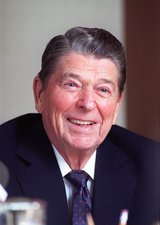Reagan: A statement, not an apology
Unlike today, 1980s foreign policy was based on strength
WashingtonTimes.com
Ronald Reagan won the Cold War, but to achieve
victory he had to convince some squishes that the
war was still on.
Reagan‘s detractors habitually dismissed him as a “cold warrior,” an elderly kook
frightfully and dangerously behind the times.
Fortunately for the cause of freedom, the Gipper
wasn’t afraid to take on world opinion, and in so
doing he changed the world.
dismissed him as a “cold warrior,” an elderly kook
frightfully and dangerously behind the times.
Fortunately for the cause of freedom, the Gipper
wasn’t afraid to take on world opinion, and in so
doing he changed the world.
To the liberal intellectual class, the Cold War ended in the early 1970s with President Nixon and detente, and any mention of the communist threat betrayed a quaintly retrograde mindset. Detente, however, brought a massive surge in Soviet nuclear and missile capability and a string of communist successes in the developing world. South Vietnam, Laos, Cambodia, Mozambique, the Congo, Angola, Benin, Ethiopia, Grenada, Nicaragua, South Yemen and Afghanistan all fell under the sway of communism in the 1970s, more countries than in any other single decade. The Cold War hadn’t ended; America had simply stopped fighting.
Reagan understood the nature of the threat. The United States was locked in a life-and-death struggle with a universalist ideology that sought to subvert human liberty and impose its own rigid, collectivist dogma. The conflict’s outcome would be determined by this clash of ideas. As Reagan said in 1982, “The ultimate determinate in the struggle now going on for the world will not be bombs and rockets but a test of wills and ideas - a trial of spiritual resolve; the values we hold, the beliefs we cherish and the ideas to which we are dedicated.”
Reagan was castigated for calling the Soviet Union an “evil empire,” but this precise phrase accurately reflected his view of the struggle. The Reagan Doctrine of supporting anti-communist movements around the globe was the direct product of his most deeply held beliefs. Reagan did not hide from the threat or pretend it didn’t exist; he did not welcome it or make attempts at outreach; he did not counsel peaceful coexistence. Reagan set out to fight the threat and win.
The governing principle of Reagan‘s national-security policy was “peace through strength.” It’s a timeless concept that needs to be resurrected. “Of the four wars in my lifetime,” he said, “none came about because the U.S. was too strong.” He set about rebuilding the hollow forces of the 1970s. He modernized military equipment and expanded the capabilities of all the services. He also restored national pride in the military that had been wounded during the Vietnam period and was a tireless advocate for the unsung heroes of the war in Southeast Asia. As the president said at Omaha Beach in 1984, “We will always remember. We will always be proud. We will always be prepared, so we may always be free.”
The 40th president’s national-security leadership applied across the board. Reagan rebuilt the capabilities of the CIA, which had been partially dismantled by President Jimmy Carter, restoring it as an effective tool of foreign policy. At the nuclear level, Reagan revamped and focused U.S. doctrine, modernized nuclear forces and resurrected missile defense as a key ingredient in American nuclear strategy. His critics derided the Strategic Defense Initiative as “Star Wars,” but the missile-shield program focused the attention of the Soviet Union, whose leaders feared it would fatally undercut their nuclear superiority.
Most importantly for the fight between freedom and tyranny, Reagan rebuilt the U.S. economy. In 1964, Reagan said, “There can be no security anywhere in the free world if there is no fiscal and economic stability within the United States.” Reagan put the moribund economy he inherited from Carter on a growth path so vigorous that his critics had to resort to complaining about an “overheated” economy. The Gipper demonstrated to Soviet rulers that their command economy could not outspend, outgrow or compete with American capitalism.
Behind Reagan‘s greatness was unfailing optimism and faith in the American mission. This land is the shining city on a hill. In 1987, on the bicentennial of the Constitution, Reagan said, “The guiding hand of Providence did not create this new nation of America for ourselves alone, but for a higher cause: the preservation and extension of the sacred fire of human liberty.” This firm belief allowed Reagan to be an effective advocate for America on the world stage. He never doubted that the United States was, as he said in his farewell address, “a beacon, still a magnet for all who must have freedom, for all the pilgrims from all the lost places who are hurtling through the darkness, toward home.”
Reagan knew there was no shame in America’s strength, its freedom or its accomplishments - that Americans live lives that are “a statement, not an apology.” U.S. leaders who believe and keep this vision will always maintain the strength of this blessed nation. Those who do not will never understand where they went wrong.
© Copyright 2011 The Washington Times, LLC.

